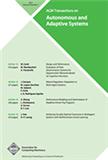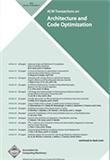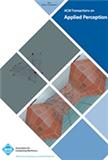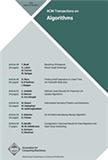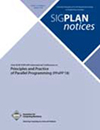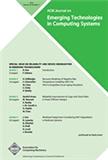Swarm and Evolutionary Computation
SCIE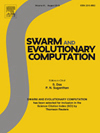
- 雜志名稱:群體和進(jìn)化計(jì)算
- 簡(jiǎn)稱:SWARM EVOL COMPUT
- 期刊ISSN:2210-6502
- 大類研究方向:工程技術(shù)
- 影響因子:6.33
- 數(shù)據(jù)庫類型:SCIE
- 是否OA:No
- 出版地:NETHERLANDS
- 年文章數(shù):58
- 小類研究方向:工程技術(shù)-計(jì)算機(jī):人工智能
官方網(wǎng)站:http://www.journals.elsevier.com/swarm-and-evolutionary-computation/
投稿網(wǎng)址:http://www.evise.com/evise/faces/pages/navigation/NavController.jspx?JRNL_ACR=SWEVO
Swarm and Evolutionary Computation
英文簡(jiǎn)介To tackle complex real world problems, scientists have been looking into natural processes and creatures - both as model and metaphor - for years. Optimization is at the heart of many natural processes including Darwinian evolution, social group behavior and foraging strategies. Over the last few decades, there has been remarkable growth in the field of nature-inspired search and optimization algorithms. Currently these techniques are applied to a variety of problems, ranging from scientific research to industry and commerce. The two main families of algorithms that primarily constitute this field today are the evolutionary computing methods and the swarm intelligence algorithms. Although both families of algorithms are generally dedicated towards solving search and optimization problems, they are certainly not equivalent, and each has its own distinguishing features. Reinforcing each other's performance makes powerful hybrid algorithms capable of solving many intractable search and optimization problems.About the journal:Swarm and Evolutionary Computation is the first peer-reviewed publication of its kind that aims at reporting the most recent research and developments in the area of nature-inspired intelligent computation based on the principles of swarm and evolutionary algorithms. It publishes advanced, innovative and interdisciplinary research involving the theoretical, experimental and practical aspects of the two paradigms and their hybridizations. Swarm and Evolutionary Computation is committed to timely publication of very high-quality, peer-reviewed, original articles that advance the state-of-the art of all aspects of evolutionary computation and swarm intelligence. Survey papers reviewing the state-of-the-art of timely topics will also be welcomed as well as novel and interesting applications.Topics of Interest:Topics of interest include but are not limited to: Genetic Algorithms, and Genetic Programming, Evolution Strategies, and Evolutionary Programming, Differential Evolution, Artificial Immune Systems, Particle Swarms, Ant Colony, Bacterial Foraging, Artificial Bees, Fireflies Algorithm, Harmony Search, Artificial Life, Digital Organisms, Estimation of Distribution Algorithms, Stochastic Diffusion Search, Quantum Computing, Nano Computing, Membrane Computing, Human-centric Computing, Hybridization of Algorithms, Memetic Computing, Autonomic Computing, Self-organizing systems, Combinatorial, Discrete, Binary, Constrained, Multi-objective, Multi-modal, Dynamic, and Large-scale Optimization.Applications:Furthermore, the journal fosters industrial uptake by publishing interesting and novel applications in fields and industries dealing with challenging search and optimization problems from domains such as (but not limited to): Aerospace, Systems and Control, Robotics, Power Systems, Communication Engineering, Operations Research and Decision Sciences, Financial Services and Engineering, (Management) Information Systems, Business Intelligence, internet computing, Sensors, Image Processing, Computational Chemistry, Manufacturing, Structural and Mechanical Designs, Bioinformatics, Computational Biology, Mathematical and Computational Psychology, Cognitive Neuroscience, Brain-computer Interfacing, Future Computing Devices, Nonlinear statistical and Applied Physics, and Environmental Modeling and Software.
Swarm and Evolutionary Computation
中文簡(jiǎn)介為了解決復(fù)雜的現(xiàn)實(shí)世界問題,科學(xué)家們多年來一直在研究自然過程和生物——無論是模型還是比喻。優(yōu)化是許多自然過程的核心,包括達(dá)爾文進(jìn)化論、社會(huì)群體行為和覓食策略。在過去的幾十年中,自然啟發(fā)的搜索和優(yōu)化算法領(lǐng)域有了顯著的發(fā)展。目前,這些技術(shù)被應(yīng)用于各種問題,從科學(xué)研究到工商業(yè)。目前主要構(gòu)成這一領(lǐng)域的兩大算法家族是進(jìn)化計(jì)算方法和群智能算法。雖然這兩個(gè)算法家族通常都致力于解決搜索和優(yōu)化問題,但它們肯定不是等價(jià)的,而且每個(gè)算法都有其獨(dú)特的特點(diǎn)。相互增強(qiáng)的性能使得強(qiáng)大的混合算法能夠解決許多難以解決的搜索和優(yōu)化問題。關(guān)于期刊《群計(jì)算與進(jìn)化計(jì)算》是同類刊物中第一本經(jīng)過同行評(píng)議的刊物,旨在報(bào)道基于群和進(jìn)化算法原理的自然啟發(fā)智能計(jì)算領(lǐng)域的最新研究和發(fā)展。它出版先進(jìn)的、創(chuàng)新的和跨學(xué)科的研究,涉及理論、實(shí)驗(yàn)和實(shí)踐方面的兩種范式及其雜交。群和進(jìn)化計(jì)算致力于及時(shí)出版非常高質(zhì)量的,同行評(píng)議的,原創(chuàng)的文章,推進(jìn)所有方面的進(jìn)化計(jì)算和群體智能的藝術(shù)狀態(tài)。此外,我們亦歡迎市民就最新的研究課題發(fā)表意見,并提供新穎和有趣的應(yīng)用。感興趣的題目:感興趣的課題包括但不限于:遺傳算法、遺傳規(guī)劃、進(jìn)化策略、進(jìn)化規(guī)劃、差異進(jìn)化、人工免疫系統(tǒng)、粒子群、蟻群、細(xì)菌覓食、人工蜜蜂、螢火蟲算法、和諧搜索、人工生命、數(shù)字生物、分布算法估計(jì)、隨機(jī)擴(kuò)散搜索、量子計(jì)算、納米計(jì)算、膜計(jì)算、以人為中心的計(jì)算、算法雜交、模因計(jì)算、自主計(jì)算、自組織系統(tǒng)、組合、離散、二進(jìn)制、約束、多目標(biāo)、多模態(tài)、動(dòng)態(tài)、大規(guī)模優(yōu)化。應(yīng)用程序:此外,該期刊還通過在各領(lǐng)域和行業(yè)發(fā)表有趣和新穎的應(yīng)用來促進(jìn)工業(yè)的吸收,這些領(lǐng)域和行業(yè)處理具有挑戰(zhàn)性的搜索和優(yōu)化問題(但不限于):航空航天、系統(tǒng)和控制、機(jī)器人、電力系統(tǒng)、通信工程、業(yè)務(wù)研究和決策科學(xué)、金融服務(wù)和工程、(管理)信息系統(tǒng)、商業(yè)情報(bào)、互聯(lián)網(wǎng)計(jì)算、傳感器、圖像處理、計(jì)算化學(xué)、制造、結(jié)構(gòu)和機(jī)械設(shè)計(jì)、生物信息學(xué)、計(jì)算生物學(xué)、數(shù)學(xué)和計(jì)算心理學(xué);認(rèn)知神經(jīng)科學(xué),腦機(jī)接口,未來計(jì)算設(shè)備,非線性統(tǒng)計(jì)和應(yīng)用物理,環(huán)境建模和軟件。
Swarm and Evolutionary Computation
中科院分區(qū)| 大類學(xué)科 | 分區(qū) | 小類學(xué)科 | 分區(qū) | Top期刊 | 綜述期刊 |
| 計(jì)算機(jī)科學(xué) | 1區(qū) | COMPUTER SCIENCE, THEORY & METHODS 計(jì)算機(jī):理論方法 COMPUTER SCIENCE, ARTIFICIAL INTELLIGENCE 計(jì)算機(jī):人工智能 | 1區(qū) 2區(qū) | 是 | 否 |
Swarm and Evolutionary Computation
JCR分區(qū)| JCR分區(qū)等級(jí) | JCR所屬學(xué)科 | 分區(qū) | 影響因子 |
| Q1 | COMPUTER SCIENCE, THEORY & METHODS | Q1 | 10.267 |
| COMPUTER SCIENCE, ARTIFICIAL INTELLIGENCE | Q1 |
Swarm and Evolutionary Computation
中科院JCR分區(qū)歷年趨勢(shì)圖Swarm and Evolutionary Computation
影響因子精選同類領(lǐng)域期刊,熱門推薦輕松get~
-
- ACM Transactions on Autonomous and Adaptive Systems
- 期刊ISSN:1556-4665
- 大類研究方向:工程技術(shù)
- 影響因子:
- 數(shù)據(jù)庫類型:SCIE
- 咨詢投稿
-
- ACM Transactions on Architecture and Code Optimization
- 期刊ISSN:1544-3566
- 大類研究方向:工程技術(shù)
- 影響因子:1.444
- 數(shù)據(jù)庫類型:SCIE
- 咨詢投稿
-
- ACM Transactions on Applied Perception
- 期刊ISSN:1544-3558
- 大類研究方向:工程技術(shù)
- 影響因子:
- 數(shù)據(jù)庫類型:SCIE
- 咨詢投稿
-
- ACM Transactions on Algorithms
- 期刊ISSN:1549-6325
- 大類研究方向:工程技術(shù)
- 影響因子:
- 數(shù)據(jù)庫類型:SCIE
- 咨詢投稿
-
- ACM SIGPLAN NOTICES
- 期刊ISSN:0362-1340
- 大類研究方向:工程技術(shù)
- 影響因子:
- 數(shù)據(jù)庫類型:
- 咨詢投稿
-
- ACM Journal on Emerging Technologies in Computing Systems
- 期刊ISSN:1550-4832
- 大類研究方向:工程技術(shù)
- 影響因子:2.013
- 數(shù)據(jù)庫類型:SCIE
- 咨詢投稿
精選常見問題,答疑解惑輕松get~
- 三篇ssci論文怎么同時(shí)投出去
- 中文核心和sci哪個(gè)影響力更大
- 中科院一區(qū)和JCR一區(qū)期刊占比區(qū)別
- 發(fā)ssci如何快速找合適的期刊
- 資源保護(hù)方面論文投sci指導(dǎo)
- 外貿(mào)行業(yè)論文發(fā)ssci周期長嗎
- 國外的sci投到錄用一般多久
- ssci期刊國內(nèi)認(rèn)可度
- 核能應(yīng)用論文翻譯英文發(fā)sci容易的方法
- 人口老齡化研究論文符合ssci領(lǐng)域嗎
- sci開源和不開源分別是什么意思?有什么影響?
- ssci發(fā)表是高水平學(xué)術(shù)論文嗎
- 生態(tài)修復(fù)主題英文論文會(huì)收錄哪些數(shù)據(jù)庫
- 哲學(xué)專業(yè)論文發(fā)英文期刊
- 中科院sci四個(gè)區(qū)的劃分
- ssci期刊和sci期刊的區(qū)別
- ESCI和SCIE要分清
- ssci送審論文多久出結(jié)果
- ssci論文二作有用嗎
- 水土保持類英文期刊好選嗎
- ssci期刊論文一定會(huì)檢索嗎
 投稿咨詢
投稿咨詢

